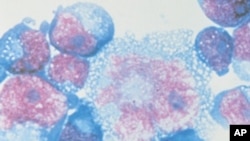Researchers have developed a topically-applied molecular microbicide capable of preventing HIV transmission. The medication works by silencing the genes that promote infection.
The microbicide is predicted to have long-lasting effects in mice and could lead to the development of an intravaginal microbicide to protect women against HIV infection, possibly for weeks at a time.
For years, scientists have tried to develop a topical microbicide to stop HIV transmission. It might be a gel or cream, used vaginally, that would act against the AIDS virus.
A variety of approaches have been tried. In newly published research, scientists at Harvard Medical School and other institutions show that RNA interference can block the virus from infecting healthy cells.
RNA interference is used by primitive organisms in place of the kind of immune system that we have. It's only been a decade or so that scientists have been trying to harness it to control human disease.
Lead researcher Judy Lieberman explains that RNA interference is a mechanism that can silence, or "knock down" the action of one gene at a time.
"And so we were able to knock down either viral genes or the host receptor for HIV, which is called CD4, and show that we could prevent the spread of HIV infection in culture."
Doing that in culture, in the lab, is one thing. It turns out that getting RNA interference to work in the immune cells targeted by HIV is not easy.
But in a new publication, Lieberman and her colleagues describe how they did it, using mice that were genetically modified to give them a more human-like immune system. "And what this paper shows is a new way to induce gene silencing in immune cells that actually works in vivo," she says.
This is not the first topical microbicide developed to stop HIV transmission, but Lieberman says the others typically require that a woman use the product just before having sex.
"And that's a huge impediment. So what's attractive about what we've developed is that the effect appears to be quite durable, and it might be possible to treat yourself and have the protection last for a week or so."
RNA-interference is not specific to HIV/AIDS. Lieberman says previous research show that RNA can be effective in controlling some cancers and a virus that causes breathing problems in newborn babies.
But there are still challenges. "The big obstacle has been," Lieberman says, "how do you get these drugs into cells? And what we're excited about is that we now have a way, not only of introducing RNA into cells, but of also targeting them into specific cell types."
Lieberman says one advantage to RNA-based medicine is that because it is so targeted against specific genes, safety and side effects are less of an issue.




